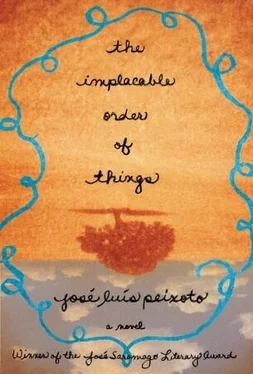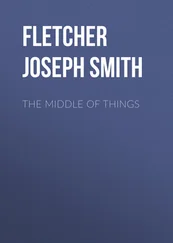Old Gabriel came in and out of the bedroom repeatedly. He would come in and silently proceed to the last chair, walking past the silence of José and Salomão; then he would go out and stand like a quiet man among the men who talked. He came in and went out, marking time. And when the two wagons appeared at the top of the street, old Gabriel saw them arrive. The first was the funeral wagon, painted a shiny black, and it carried a small child’s coffin, white and trimmed with gold lines. The second was Pedro’s wagon, chosen because it was almost new and in perfect condition, and it carried the coffins of the blind prostitute and Master Rafael. Old Gabriel looked at the wagons approaching slowly. They came in a cool breeze brought by the late afternoon. They came in an ever-nearer, sadly clearer light. The birds flew in silence. The water gently trickled in distant fountains. At the house of Master Rafael they stopped. The men gathered around. The only sounds were of footsteps and meaningless noises. The funeral wagon was pulled by two men. Pedro’s wagon was pulled by a young, scrubbed donkey. The men brought the coffins into the bedroom. Salomão, José, and all the women stood up. First they brought the coffin for the baby. A little angel’s coffin. Salomão watched the baby girl being placed inside, and as they shut the lid to the coffin, her face was that of a living baby, a baby who was just sleeping, a beautiful baby. Next they brought the coffin for the blind prostitute. Two men hoisted her up, and her head fell slightly back, her hair touching the bedspread and then the bottom of the coffin. At last they brought the coffin for Master Rafael. It was made of good wood, as he would have wanted. Salomão stretched out his coat and trousers in the bottom of the coffin, and they hauled it away, no heavier than when they brought it. Salomão and José followed it out to the street. A crowd of gazing eyes and the sky. The coffins lay on the wagons, the baby girl in front, followed by her parents. And the procession began. Slowly. Salomão and the apprentice walked right behind the wagons. Down each and every street. Slowly. Past each and every house. Salomão kept walking, through each and every moment. Salomão kept walking and knew that the next day or the next week, or on some day yet to come, he would have to pass by the house of the blind prostitute and Master Rafael, and it would be an empty and abandoned house. Salomão kept walking. At the cemetery seven men carried the coffins: one man carried the baby girl, four men carried the blind prostitute, and two men carried Master Rafael. And the cemetery lay open before them. They wended through the tombstones, along the walkway of withered grass and earth. At the far end was a large grave, where they placed the three coffins, side by side.
HE LOOKED AT ME WITH A SERIOUS air. He ran his fingers through his beard, as if to disentangle it. It’s all right if you don’t go today, old Gabriel told me. He looked at me with a serious air. The sun was out and many men stood around the door of Master Rafael’s house. My mother, not understanding why we had stopped, pulled me by the arm. It’s all right if you don’t go today, he said, and he smiled at my mother as always. But I had to go. I sat my mother down in a shady spot in the yard, quickly gave her some soup, and then, as I always did, every other day, I took the road to the Mount of Olives, with a scarf on my head. I quickened my pace when I reached the gate. I turned the key and entered the rich people’s house. I passed through the empty rooms. The fireplaces all cold, the large empty chairs staring at me, the shadows of the furniture sprawling across the dim interior, darkness on darkness. I sat down in the main hallway and listened to the voice shut up inside a trunk. Its words echoed in the silence intermittently, as if spoken as they were remembered. At each pause, the previous sentence lingered on the walls, written on the whitewash with the color of whitewash. It said: it’s coming slowly, but it’s coming, and it will be an infinite day, an everlasting night, a frozen moment that won’t be a moment; and great matters will be smaller than the pettiest ones, and greater matters will be yet greater because they’ll be the only ones. I didn’t understand this saying from the voice shut up inside a trunk until today, when I woke up. Today, as the first and still-feeble light fell across my bed, I heard these words in my head. I heard these words, understanding each one, and I woke up. I slowly sat up under the sheet. I looked at my mother, I looked at Salomão. I lowered the sheet and looked at my belly, at my son who won’t be born. Death seemed to me a simple thing. In the morning light that deliberately deceived me, death seemed to me a suffering equal to that of living, gazing upon a new day, knowing everything I know.
My mother was the first one to open her eyes. And for her, waking up meant only that: to open her eyes, to suddenly open her eyes without changing her expression, to open her eyes and keep on with the next word of her story. Salomão slept the heavy slumber of dejection for not having found a day laborer’s job or any kind of paying work. I slowly lifted my mother up by the arm, dressed her, and led her to the kitchen. I gave her some coffee. And I wanted to talk to her. I held her face between my hands. And I said nothing, since there are no words for calling her. Mother. Death is that solitude from where you don’t see me, where we’re not together. And I wanted to say mother. But I could only look at her, I could only see the silence of the word mother in the clear and cool air, in the empty kitchen inhabited by our two solitudes. And I gave her my hand. The skin of her rough fingers furrowed by knives that had cut potatoes into strips, that had chopped collard greens and sliced melons. Their bones deformed. Her hands I know so well and held so often, where I find some slight warmth and longing. And I sat her down in the yard. I sat her down in the same shady spot as yesterday and every day. I brought her the miniature pots and pans and silverware for dolls. And I stayed and watched her. She grabbed a clump of grass, collected drops of dew inside a tiny pot, gathered a pile of pebbles and another of pure dirt. Then she carefully mixed portions of dirt, grass, and dewy water. The morning was far from her and far from me. In the mounting heat I watched her, as if I hadn’t already seen her and it weren’t just a painful memory. Behind me the bedsprings groaned with the wearied sound of Salomão getting up.
The kitchen walls were the sad and faint reflection of the morning’s light and innocence. From yesterday’s dishes, turned upside down to dry, I grabbed a pot for lunch. I acted as if preparing the food were of the utmost importance. Standing there, making useless motions with my hands at the usual speed they worked, I watched Salomão from out of the corner of my eye. Disheveled and unshaven, looking anxious, with his shirt misbuttoned and half out of his trousers, and his belt too loose, Salomão stumbled into the kitchen like a man drunk on brandy, searching for my gaze with his wide-open eyes, like a helpless soul. And whenever his face came within a foot of my eyes, I pretended to be looking for an onion, or wiping up a drop of oil, or picking up a potato peel from the floor. Salomão, who was never mine, whom I only felt sorry for but who imagined he was mine, since he had always imagined he was someone’s and had never, since childhood, let his actions be themselves. Salomão, in the kitchen, like a body without a body’s substance, like a thing, like a body that was a breeze or a silence, like a piece of a person: an innocuous voice, a dull gaze: a piece of a person that had seen itself suddenly promoted into a whole person, with full responsibility and a full quota of suffering. And in the sharp clarity, as the boiling water lifted the potatoes and I felt I was literally boiling within, in the moment when the walls were walls and everything seemed to be exactly what it was, with everything definitively existing at each instant, I looked at Salomão, who was looking steadily at me. Eye to eye, as if we saw each other. And in his gaze or in my gaze, I found what we might have been, were it not for life: the tiny moments we would have deemed greater than these and greater than all moments, since we would have known no others. And in that clarity, as I began to take notice of Salomão, of his face and his shoulders and his arms, the whole of him began coming undone: the skin on his face started cracking like parched earth, coming loose from his flesh and dripping thick blood; and in that red blood, in the bones poking out from beneath his flesh, his eyes kept looking at me, larger and with the same weakness and the same innocence. It was like death, like dying. I lowered my gaze to Salomão’s unlaced boots, and when I looked back up, I saw his face intact and his eyes suspended in the same fragility, like a woman or child on the verge of tears. But I knew it hadn’t been an illusion of my seeing, I knew it for certain, I knew it was the world’s ultimate clarity. I drew closer to him. I stripped him, as if I were stripping an image or a statue or a child, and in the bedroom I picked out some freshly washed and ironed clothes. A pair of trousers, a white shirt. And time mercifully seemed to enlarge to become the moment when we were most together, in which all our tenderness converged and all our gestures asked forgiveness for what wasn’t our fault. I dressed him in the white shirt, which was still smooth on his body, I dressed him in the trousers, placing two coins in one of the pockets, I slowly tightened his belt. I sat him in a chair and, amid the light and shadows, I patiently and carefully and affectionately combed his hair. And as I opened the door for him, as I saw him walk past me, knowing he would go to Judas’s general store, as I saw him grow smaller in the distance and vanish at the end of the street, I knew for certain that it was the last time, I knew that never again, never again would we meet.
Читать дальше












